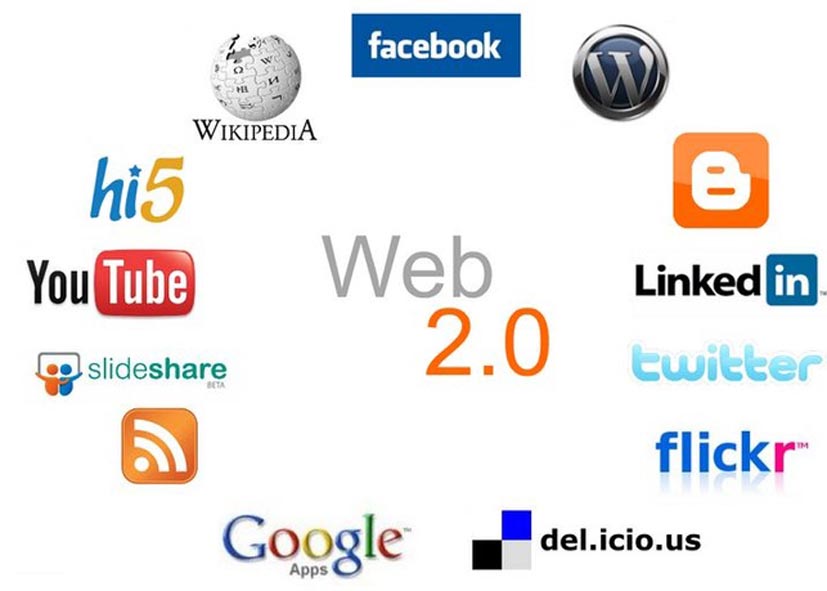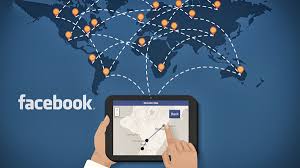'Web based Communication technologies' is an extremely interesting subject because it's something that is always changing, evolving and advancing. Therefore, for each intake of students there will continually be different ideas to talk about and explore. As humans further their knowledge and trends within society change, so does social media and the Web 2.0 platforms we use. Web 2.0 aims to facilitate collaboration, the sharing and sparking of ideas amongst online communities, the ability to discuss and debate creating a democratic network. It goes beyond the traditional 'call and response' and it's only by using these platforms in their entirety that they continue to grow and expand.
Check out Tim O'Reilly's Meme map outlining Web 2.0 (
http://www.oreilly.com) :

Facebook was initially created so that US college students could converse with one another. It wouldn't be half as valuable or useful of it wasn't for the millions of members who decided to register and use this medium in order to communicate. We create appeals, petitions, we support charities, aid police investigations, re-unite people and so on via this medium. It is a huge support network. The sheer volume of numbers and usage is why it continues to progress and advance itself. By continual sharing of information, tagging in photos, sending friend requests etc; Facebook can recommend articles and videos that may be of interest, prompt face recognition, display people you may know through similar friendship circles and much more. It can save your location history to connect you with near by places of interest or speed up your searches. Furthermore, people share and discover one another's personal and professional news via Facebook. I certainly wouldn't be as up to date with current affairs or people's lives if it wasn't for social media. It is a huge part of the journalism that I read. Does that make us all journalists to some extent? Are we creators and sharers of our own news and on the subjects that interest us personally? Web 2.0 supports global news coverage by sharing the stories and getting them out there to a wider, more generic audience.

Web 1.0 is defined as a direct communication between creator and consumer, for example reading a newspaper. In reader one, watching television is also an example of Web 1.0 but we have an ongoing contrasting debate. Today we have 'interactive' TV's- now are they 'interactive' or are they purely 'web enhanced'? In the early days of development you could interact directly with the screen by changing channels, skipping TV commercials and pausing programmes etc. It doesn't allow the consumer to input or change information though, only alter how how they view the content. This developed in some cases to allow viewers interaction via text messages, phone ins & 'the red button'. They could provide an input, potentially influencing plot lines and characters. Programmes like BBC's The Voice allow audience members to predict winners, ITV's The Million Pound Drop allows you to play alongside for example. Now we have things such as 'Apple tv' in which mobile phones and and the World Wide Web coordinate with the television companies in order to get data from our devices and from the Internet onto our television sets. Another name for this is 'participation tv' - participation, i.e. interacting being what Web 2.0 is all about. So do you class TV as Web 1.0 or Web 2.0? Will it be necessary to have a television set and a computer as the two become increasingly combined? The above is an example of how new information and communication technologies can actually enhance and progress/replace existing structures rather than creating more new production opportunities and competitors.

The invention of the smart phone and 'apps' has definitely shaped society massively. This by altering the way we communicate and by providing us with several options of how to interact with one another. It's a wonder what we did before this phenomenon occurred. By having a smart phone and registering to the varying social mediums, we have greater scope when expanding and maintaining networks. It allows us the opportunity to develop a vast and diverse range of contacts outside of our normal circles and beyond our existing, direct friendships/professional relationships. These have developed over the years and some forms are often more beneficial to certain businesses than others. Multi media micro blogs are currently trending and platforms such as Instagram, YouTube and Pinterest are taking the world by storm. As human beings, we seem to connect more and become more emotionally effected by visuals. With the food and fitness industry being one of the most popular at the moment, these social media forms are hugely beneficial. It enables bloggers to display imagery of food and physique, 'how to' videos of recipes and exercises. I think the reason Facebook still remains popular is because it combines micro blogging with multi media blogging and messaging/calling. It caters to several needs both personally and professionally.

Convenience and time are key concepts when it comes to web based communication technologies as it would be impossible to manage the volume of links we create through face to face meetings or mail. It is through these technologies that we can reach out to our custom on a more personal level, thus creating greater rapports as a result of positive feedback and professional 'conversation'. I often get 'pinged' via Facebook for teaching work. If I've worked for someone before, or even if I haven't, I can add these people on Facebook to maintain or initiate relationships for future employment. It's also a really great way to meet the people your going to be working with in the dance/theatre industry before actually arriving to rehearsals on the first day, it 'breaks the ice'. I believe that you can give yourself more opportunities by having the ability to respond at speed on web based communication technologies and that it does work both ways. As an employer in the industry, it means you can easily solve issues by having out of hours access to these means of communication. For example, if a principle needed last minute cover due to illness or audition, they can post on Facebook at 8 o'clock in the evening for the following morning and still be able to arrange this. There are several groups and pages on social media for auditions, teachers etc on which people post and respond to jobs. I firmly believe that I wouldn't have had half the contacts or opportunities I've had if it wasn't for social media platforms.

It is particularly interesting to think about this form of communication across professions. As I said previously, it is a great means for last minute teaching work and various other things. However, is it acceptable to be 'friends' with your boss on Facebook? The arts is an extremely open industry in terms of the umbrella of peoples it holds and our personal boundaries. I am connected with past employers, potential employers, people that still teach me as an adult. Would this be approved of in other lines of work? I can't see teachers of secondary schools having their principle as a friend on Facebook but am I wrong? The performing arts is a very sociable industry with networking skills being a must. It would intrigue me to compare the boundaries for social media relationships across industries and to further this into face to face relationships in the work place. If I was dancing with someone at a gig I'd be likely to give them a hug or something upon greeting; but if I was teaching with some one in a school, I'd definitely go for a hand shake if anything.

On another note, using these networks can instigate a larger scope for businesses to develop and go worldwide. It allows greater custom, as well as increasing job opportunities. It is much easier and more common to work for companies abroad now, you can even do this from your own home in certain industries because of technology. My dad constructs data bases for banks and often works from home on his computer whilst liaising with colleagues from all over the world, this via email or video calling. Web communication technologies are also great for instigating personal problem solving which permits the idea and ease of working from home. It proves extremely useful for distance learning courses such as this one and even in day to day life. We have the Google search engine and intelligent users of Web 2.0 to thank for that! It is such an easy process to find information nowadays. Typing a key word or question into Google connects us to other consumers with similar enquiries or searches. Sharing our questions and our knowledge with others, helps to further self service problem solving on the Internet. Leaving intelligent feedback additionally enables the filtering of effective posts and information to none effective. We become a wiser and more helpful community by continued use.

Furthermore, Web 2.0 helps to create a democratic, virtual community. Collaborating, sharing your ideas and thoughts, providing feedback and opinions are things that are certainly encouraged. Equality and hierarchy are interesting topics to consider in reference to this. Does using Web 2.0 make for a more equal workplace? Does hierarchy diminish between roles if we now deliberate and act collectively? Is it easier to transition between positions if 'produsage' is a true concept and employees are on a more even platform? It's also good to acknowledge that we may have people from a range of backgrounds i.e. a combination of 'professionals' and 'amateurs' working together via the Internet. There's a mutual respect that evolves within society and a development of relationships, in which strangers and almost strangers act as equals on the web to generate ideas, suggestions and feedback. Creating democratisation on the Internet and allowing us to be in control of what we produce or consume, inspires people to actively think about their own ethics and access rather than consulting external sources. It provokes us to consider what we would deem acceptable behaviour and promote this via example. It is important to think about what you say, participate in and discuss when using Web 2.0. What do you want to be associated with? If you wouldn't want your mum or your employer to see it, then should you be saying or doing it?

Authenticity, copyright and confidentially are all areas to be considered with a great deal of importance. Eg. Teachers working with children are encouraged to alter their identity on social media and are forbidden to communicate with students via Facebook and text message. Professional reputation must be adhered to. Should we keep certain information or images to ourselves? Making a source anonymous or 'removing a tag' is essential if they haven't agreed to having information shared. It all links in with the idea of mutual respect and ethics on web based communication technologies. By using a considerate, approachable manner; we can easily present ourselves as engaging and professional whilst conforming to acceptable behaviour.
Ideas sparked and concepts for exploration ?!?!
Human Rights
Is connectivity a basic human right? Nowadays I think yes, in many educational and professional establishments it is required to have computers, wifi, applications etc. Are we minimising our own opportunities if we don't have the access to wifi and devices? These are expensive to obtain and run, what if we can't afford this? Is it a work place's or university's responsibility to provide connectivity and laptops? Most places do but does is it still reduce our opportunities if we cannot continue learning at home or if we don't have the option of completing work at home? Smart phones and devices are things that were originally banned in a classroom environment but now, the use of these are encouraged even in our children's education. Interactive white boards, iPads are being used for learning purposes and even personal mobile phones are sometimes permitted. Teachers are using Google + and Facebook to facilitate interactive learning.
Marketing
The marketing industry takes advantage of Web 2.0 for their benefits by considering major social media sites as potential markets. Online sales and promotions are becoming more and more popular. Does online marketing affect my use on social media? Do I acknowledge advertisements and pop ups or do I just close them down and switch to alternative sites? Is the use of Web 2.0 in marketing affecting our retail stores? We've seen several stores close over the past decade or so and profits decline. How many people shop online? Do businesses need a store base or can they again do this from home/via the web only? Is the use of Web 2.0 affecting the printing industry? How many people view and send documents online as apposed to having hard copies? Even the majority of banking and utility bills are accessed via Internet accounts now.
Mental & Physical Health
I believe there have been many personal effects due to the smart phone. I know for me personally, if someone doesn't pick up their mobile it often creates an element of concern. On certain messaging applications you can see when a person has read the message, so well as it being a great indicator as to whether it's been received or not, it can also instigate negative emotions if you don't receive a response- have I said something wrong?
It used to be that people worked to live but do we now live to work? The working days become longer and can interfere with personal time. We feel the need to respond to emails and messages because people know it's accessible & quick. We spend the evenings sat on our devices rather than engaging in actual conversation. You often see people working or glued to their phones during meal times and eating on the go is much more common today. It would be interesting to look at individuals' web usage and the links to mental/physical health. My boyfriend and I actively decide to turn our phones off on a Sunday if we are able to. Not only is it better for our relationship in the sense that
we have more quality time together but I certainly notice my stress levels decrease and I always sleep better.
I would particularly like to further explore what mental and physical health conditions are caused or heightened because of social media and internet devices. Here are some examples of mental health issues and side affects I've thought of, and possible reasonings:
Anxiety, stress, depression, lack of confidence, body dysmorphia, OCD, isolation, pressure.
- Worry if receive no reply, waiting for important phone calls, no answer.
- Always getting messages or notifications, working out of hours because of accessibility and speed.
- Looking at others people lives on Facebook, comparing ourselves, counting number of friends/likes.
- Taking selfies, having ability to edit and change pictures.
- Having the need to check social media all the time, keep fingers busy and minds occupied.
- Losing face to face social skills, can't interact in person, lose direct relationships.
- Media looking for our faults before our successes. Displays 'ideal' image.





